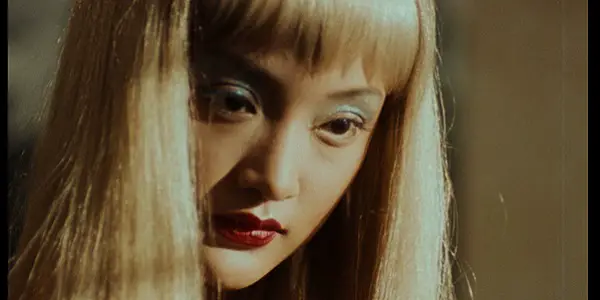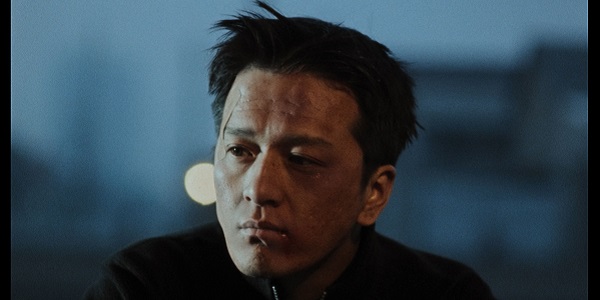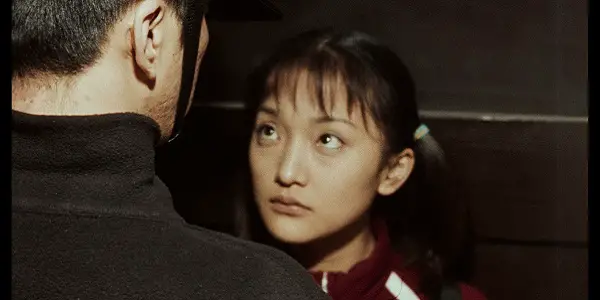SUZHOU RIVER: A Spellbinding Shanghai Neo-Noir

Lee Jutton has directed short films starring a killer toaster,…
A dreamlike evocation of love and longing on the banks of the titular river running through Shanghai, Lou Ye‘s Suzhou River is a landmark film from what is often referred to as Mainland China’s Sixth Generation — the filmmakers who came of age in the aftermath of the Cultural Revolution, as the country began to emerge from relative isolation and evolve into an international economic power. As everyday life was rapidly changing, the filmmakers of the Sixth Generation were depicting the effects of these changes onscreen; their films told the stories of the people living on the fringes of society, left behind by the big economic boom to succumb to feelings of urban alienation.
These feelings are present throughout Suzhou River, a romantic neo-noir whose plot and style call to mind films such as Alfred Hitchc*ck’s Vertigo, Krzysztof Kieślowski’s The Double Life of Véronique, and Wong Kar-wai’s Chungking Express. Originally released in 2000, Suzhou River is now available in a new 4K restoration that fortunately preserves all of the visual roughness that makes its depiction of life amidst the grit and grime of this polluted river so strangely enchanting.
Double Vision
Suzhou River is narrated by a largely unseen, anonymous videographer (Hua Zhongkai) whose stenciled advertisements for his business are ever-present on the faded, crumbling facades of the waterfront’s abandoned buildings. From his balcony, the videographer is able to watch everyone coming and going along the river — including his girlfriend, Meimei (Zhou Xun), who works at a local dive bar performing as a mermaid in a tank of water. The enigmatic Meimei often disappears for days at a time, leaving our narrator distraught; like the creature that she makes a living imitating, she’s almost more myth than reality.

The narrative then diverges as the narrator tells the doomed love story of Mardar (Jia Hongsheng) and Moudan (also Zhou Xun). Motorcycle courier Mardar has been hired by Moudan’s rich businessman father to transport the girl to her aunt’s house whenever her father is hosting one of his mistresses; he and a few other small-time crooks are also planning to kidnap Moudan and hold her for ransom.
Falling in love with Moudan is not part of Mardar’s plan, yet it happens nonetheless; when the kidnapping plot goes awry and Moudan disappears, Mardar devotes himself to searching for her. In Meimei, he thinks he has finally found her again — but is this lookalike really the same sweet young girl who told Mardar that if she ever reentered his life, it would be as a mermaid? Or is it just a strange coincidence?
Drifting Into a Dream
With the film’s central focus being a man’s obsession with figuring out whether a mysterious lookalike is the same woman he previously loved and lost, it is impossible not to see the influence of Vertigo on Suzhou River. Yet Lou’s film is no mere Hitchc*ck knockoff but a stylish cinematic accomplishment in its own right. The film is shot with a handheld camera that is almost always moving and often shows us events directly from the unseen videographer’s perspective, as though we too are watching the world through his viewfinder. This distinctive, somewhat voyeuristic style, courtesy of cinematographer Wang Yu (Lou’s Purple Butterfly, Jia Zhangke’s 24 City) feels a bit strange when the film then switches to Mardar’s story, which takes place in the past; the videographer was not present at these events, so why are we still viewing them as those he was?

This storytelling choice invites additional ambiguity into the narrative — is the videographer’s version of events the accurate one? Did he invent the whole story, a fantasy inspired by the endless stream of figures passing beneath his balcony on the banks of the river? “A boy and a girl who hardly know each other sit next to each other. What happens next?” our narrator muses as he recounts Mardar and Moudan’s story, almost as though he is making it all up as he goes along, before coming to the obvious but no less impactful conclusion: “Well, love, of course.”
Regardless of what you think may be the answer(s) to the various riddles presented by Suzhou River, one thing is for certain: the entire film is lovely to look at. Originally shot on Super 16 film, the new restoration doesn’t scrub away any of the grain from the original images, ensuring that the film’s gritty, underworld atmosphere remains intact and preserving a rich color palette that feels decidedly vintage despite having been shot only twenty-three years ago. (Is that considered a long time now? Maybe. I’m old enough to feel as though it isn’t.)

Jia Hongsheng made his acting comeback in Suzhou River after stepping away from movies due to addiction difficulties; he tragically passed away ten years later at the age of 43, never able to truly outrun his demons. Knowing this adds an extra element of heartbreak to his performance as Mardar, though this stoic man with the scarred cheeks has a screen presence magnetic enough to draw you in regardless. And as both the jaded, mysterious Meimei and the naive, hopeful Moudan, Zhou Xun — then a largely unknown young actress, now one of the most acclaimed and awarded in China—is remarkable. She portrays these dual characters in such a subtle, poignant way that you truly cannot make up your mind as to whether they are the same person at different points in time or two entirely different women throughout the film.
Conclusion
Even when Suzhou River reaches its conclusion — one that I have to say I was not a fan of, despite enjoying everything else leading up to that moment — it’s difficult to say whether the mystery has actually been solved; rather, it feels as though many more mysteries have been birthed in its wake, like ripples resulting from a stone being thrown in the river.
The new 4K restoration of Suzhou River is currently screening at Film Forum and begins screening at Metrograph as part of China’s Sixth Generation film series on March 24, 2023.
Watch Suzhou River
Does content like this matter to you?
Become a Member and support film journalism. Unlock access to all of Film Inquiry`s great articles. Join a community of like-minded readers who are passionate about cinema - get access to our private members Network, give back to independent filmmakers, and more.
Lee Jutton has directed short films starring a killer toaster, a killer Christmas tree, and a not-killer leopard. Her writing has appeared in publications such as Film School Rejects, Bitch: A Feminist Response to Pop Culture, Bitch Flicks, TV Fanatic, and Just Press Play. When not watching, making, or writing about films, she can usually be found on Twitter obsessing over soccer, BTS, and her cat.













